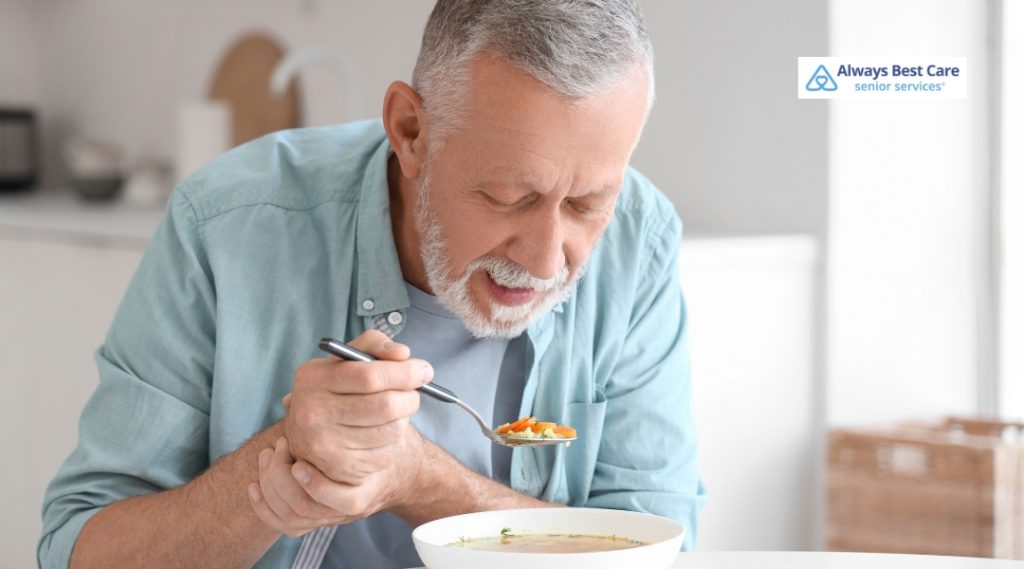The Role of Home Care in Helping Parkinson’s Patients Maintain a Healthy Weight

Maintaining a healthy weight may seem like a simple goal, but for individuals living with Parkinson’s disease, it’s often a delicate balancing act. As mobility changes, appetite fluctuates, and daily routines become more complex, nutritional needs can easily fall by the wayside.
That’s where compassionate home care steps in, not just to assist, but to empower. With the right Parkinson’s support, patients can navigate these challenges with dignity, stability, and the nourishment their bodies truly need.
Home care plays a pivotal role in promoting both physical wellness and quality of life through thoughtful, personalized strategies.
Table of Contents
Weight Challenges in Parkinson’s Disease
Weight fluctuations, especially unintentional weight loss, are common among individuals living with Parkinson’s disease, and they can have serious health implications if left unaddressed. These changes are often the result of a complex interplay between physical, neurological, and emotional factors.
As Parkinson’s progresses, motor symptoms such as tremors, rigidity, and slowed movements increase the body’s energy expenditure, meaning patients may burn more calories even while performing basic tasks.

At the same time, difficulties with chewing, swallowing (dysphagia), and loss of appetite can make it harder to consume enough calories or maintain proper nutrition. Gastrointestinal issues like constipation or delayed gastric emptying, which are also common in Parkinson’s, can further interfere with nutrient absorption and appetite regulation.
Medications used to manage symptoms can sometimes cause nausea or reduce the sense of taste and smell, further decreasing interest in food. In more advanced stages, cognitive decline and depression may also contribute to reduced meal intake or disinterest in eating altogether.
The result is often a slow but steady weight loss that puts patients at risk of muscle wasting, frailty, and reduced immune function. Understanding these challenges is the first step in developing a supportive care plan that ensures proper nutrition and promotes overall well-being.

5 Ways Home Care Helps Parkinson’s Patients Maintain Stable Weight
1. Meal Prep Support That Aligns with Nutritional Goals
Home caregivers can plan, shop for, and prepare balanced meals that meet each client’s specific dietary needs.
Whether the goal is to increase calorie intake, include more soft or easy-to-swallow foods, or ensure adequate hydration, caregivers work closely with dietitians or healthcare providers to bring those goals to life in the kitchen.
Having freshly prepared, appetizing meals readily available also reduces the effort and stress associated with eating, making it easier for patients to nourish themselves regularly.
2. Tailoring Food Choices to Manage Symptoms and Side Effects
Certain foods can ease or worsen Parkinson’s symptoms. For instance, high-fiber options help manage constipation, while protein timing may need to be adjusted around medication schedules to improve drug absorption.
Home caregivers are trained to recognize these nuances, helping patients avoid triggers like dry, hard-to-chew foods or meals that aggravate nausea. They can also offer gentle encouragement to try new textures or nutrient-dense ingredients that support energy and strength.
3. Encouraging Consistent Eating Habits Throughout the Day
One of the biggest challenges in Parkinson’s is maintaining a steady intake of calories and nutrients, especially when fatigue, forgetfulness, or low appetite interfere. Home caregivers help establish a consistent daily routine that includes scheduled meals, snacks, and hydration reminders.
This structured approach not only supports physical health but also brings a sense of normalcy and rhythm to the day, which can be deeply comforting for individuals living with a chronic condition.
4. Addressing the Root Causes of Weight Fluctuation
Parkinson’s-related weight changes often stem from more than just food choices; they’re tied to physical, neurological, and emotional challenges. Home care helps address these root causes with practical, compassionate strategies.
- Managing Swallowing Difficulties (Dysphagia) with Safe Eating Practices
Dysphagia is common in Parkinson’s and can make eating uncomfortable or even dangerous. Caregivers are trained to support safe swallowing by modifying food textures, encouraging slow, mindful eating, and using techniques prescribed by speech therapists. This not only reduces choking risks but also makes mealtime less stressful, encouraging more regular intake. - Supporting Medication Schedules That Impact Appetite and Digestion
Many Parkinson’s medications can suppress appetite, cause nausea, or affect digestion. Home caregivers help coordinate meal timing with medication schedules to minimize side effects. They also monitor for signs of poor medication tolerance and can alert healthcare providers when adjustments are needed, ensuring appetite and nutrition aren’t compromised. - Combating Fatigue That Limits Independent Meal Prep or Eating
Parkinson’s often brings physical fatigue that makes cooking or even sitting through a meal feel overwhelming. Caregivers alleviate this burden by preparing ready-to-eat meals, offering feeding assistance when necessary, and pacing meals to accommodate the patient’s energy levels.
5. Emotional and Social Benefits of Mealtime Assistance
Beyond nutrition, mealtimes are an important opportunity for social connection and emotional support, something many Parkinson’s patients deeply miss when eating alone. Home care brings warmth and companionship to the table.
Whether it’s sharing light conversation, offering gentle encouragement to finish a plate, or simply being present during a quiet moment, caregivers transform meals into nurturing rituals rather than isolated tasks.
This companionship helps reduce feelings of loneliness or depression, which are closely linked to poor appetite and unintentional weight loss. When mealtime feels joyful and connected, eating becomes easier and more meaningful.

Support That Prioritizes Health, Dignity, and Quality of Life!
Contact Always Best Care of Manchester at (860) 533-9343 to learn more and schedule your free consultation.





